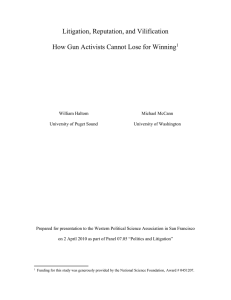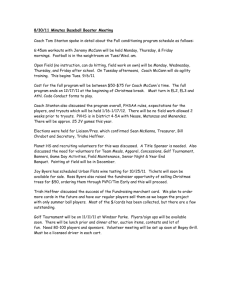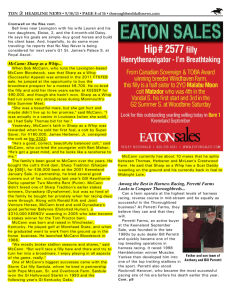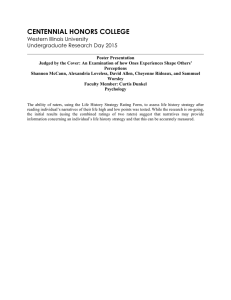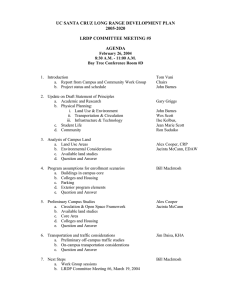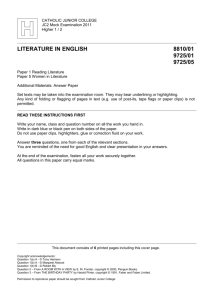Understanding Colum McCann CHAPTER 1
advertisement
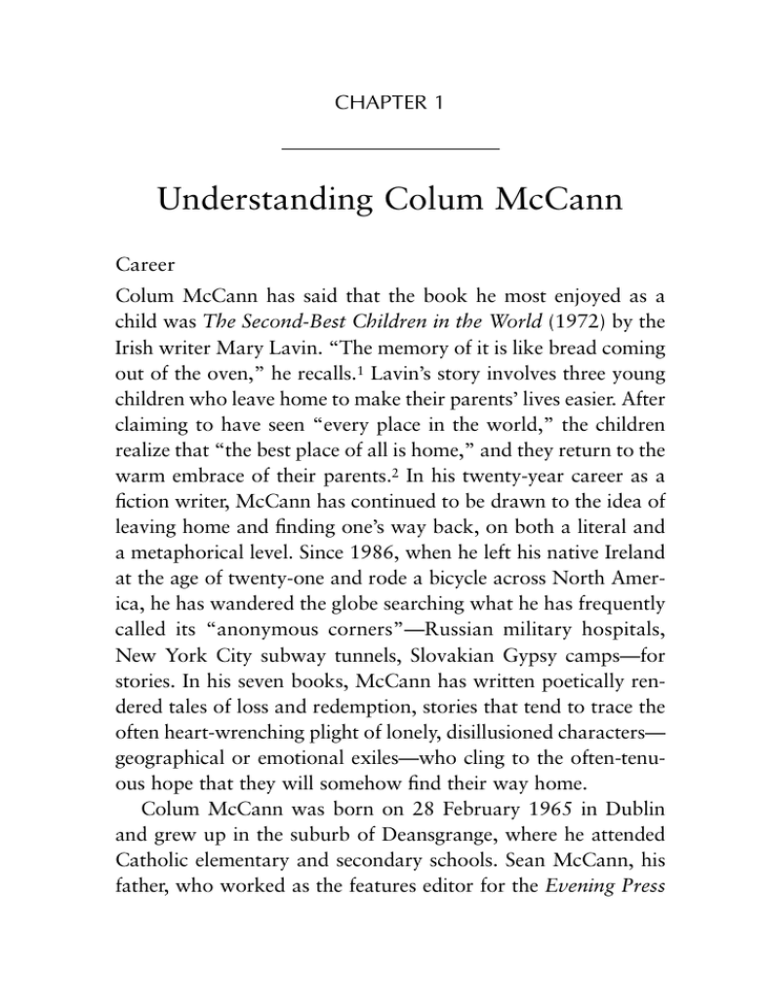
CHAPTER 1 Understanding Colum McCann Career Colum McCann has said that the book he most enjoyed as a child was The Second-Best Children in the World (1972) by the Irish writer Mary Lavin. “The memory of it is like bread coming out of the oven,” he recalls.1 Lavin’s story involves three young children who leave home to make their parents’ lives easier. After claiming to have seen “every place in the world,” the children realize that “the best place of all is home,” and they return to the warm embrace of their parents.2 In his twenty-year career as a fiction writer, McCann has continued to be drawn to the idea of leaving home and finding one’s way back, on both a literal and a metaphorical level. Since 1986, when he left his native Ireland at the age of twenty-one and rode a bicycle across North America, he has wandered the globe searching what he has frequently called its “anonymous corners”—Russian military hospitals, New York City subway tunnels, Slovakian Gypsy camps—for stories. In his seven books, McCann has written poetically rendered tales of loss and redemption, stories that tend to trace the often heart-wrenching plight of lonely, disillusioned characters— geographical or emotional exiles—who cling to the often-tenuous hope that they will somehow find their way home. Colum McCann was born on 28 February 1965 in Dublin and grew up in the suburb of Deansgrange, where he attended Catholic elementary and secondary schools. Sean McCann, his father, who worked as the features editor for the Evening Press 2 / Understanding Colum McCann in Dublin and published twenty-eight books of his own, encouraged and nurtured his son’s love of books. Sean McCann was an eclectic author, choosing subjects as diverse as Oscar Wilde, gardening, and a fictional child soccer star named Georgie Goode, the underdog hero of a series of children’s books that had a powerful, lingering impact on Colum. His fifth-grade teacher, he recalls, used to read these books aloud to the class on Friday afternoons: “I remember that moment of intense pride when Georgie would score the final goal. He’d bury it in the back of the net. It was always inevitable, but amazing how he got to that moment of inevitability. And I was stunned by the power of story, even then.”3 Not surprisingly McCann’s first effort at professional writing was an early stint as a sportswriter. At the age of eleven he began riding his bicycle through the borough of Dun Laoghaire, collecting results of the local soccer matches, and writing one-paragraph reports for the Irish Press. McCann’s mother, Sally McGonigle McCann, a homemaker, was born in Garvagh in County Derry, Northern Ireland, where Colum spent many summers in the 1970s and early 1980s. His experiences in that politically anguished region have also had a significant impact on his fiction. Sean McCann made periodic trips to America—where he lectured on cultivating roses—and brought back books for his teenage son, who quickly gained an affinity for writers associated with the Beat movement, especially Richard Brautigan, William Burroughs, Lawrence Ferlinghetti, Allen Ginsberg, Jack Kerouac, and Gary Snyder, in whose work McCann found a liberating alternative to the sorrow-filled traditional Irish stories he read in school. During the summer preceding his senior year in high school, his father gave him Benedict Kiely’s “A Ball of Malt and Madame Butterfly,” a short story that thrilled Colum with Understanding Colum McCann / 3 the possibilities of Irish fiction. What moved him most about this ribald account of the unlikely romance of a literary aesthete and a prostitute was Kiely’s language, which he felt vied with that of his favorite poet at that time, Dylan Thomas, whose books, McCann claims, “were strewn all about our house.”4 On graduation he decided he would write, and—against his father’s advice—he embarked on a career in journalism. He reflects, “I think maybe he told me not to be a journalist because he wanted me to become a fiction writer, and he was afraid that the world of journalism would swallow me asunder.”5 McCann enrolled in the journalism program of the College of Commerce, Rathmines, in Dublin, and in 1983 he was named “Young Journalist of the Year” for his highly acclaimed reporting on the plight of battered women in Dublin. While researching the story, McCann ventured for the first time into the seediest sections of the city, an act foreshadowing the intrepid and compassionate attraction to the margins of society that continues to characterize his work. During the summer of 1983 he wrote for the Connaught Telegraph, Castlebar, County Mayo, in the west of Ireland, a region for which he developed a strong affinity and which appears frequently in his early fiction. McCann graduated from Rathmines in 1984 at the age of nineteen and made his first trip to America. That summer he worked for the Universal Press Syndicate in New York while renting a one-room apartment on Brighton Beach. On his return to Dublin, he began what proved to be an unfulfilling job as a freelance journalist covering the local social and cultural scene for the Evening Press. With his father’s encouragement, he decided to move to America to become a fiction writer. McCann was twenty-one when he left Ireland in the summer of 1986, but unlike most of the estimated 150,000 Irish who 4 / Understanding Colum McCann emigrated during the second half of the 1980s, he was not compelled to leave by his country’s foundering economy. He was driven by curiosity and a wanderlust he attributes to his teenage obsession with the Beats. “From a young age I imagined the America of Kerouac and Cassady,” he claims, and when he left for the United States, he aimed “to write the great Irish American novel.”6 Settling in Cape Cod, Massachusetts, he began working as a cab driver and on a golf course. He purchased an old Remington typewriter, in which he inserted a continuous roll of paper in imitation of the roll Kerouac used while writing On the Road (1957). However, when summer ended and he had completed “only a couple of feet” of writing, he realized “it was time to get some experience beyond my immediate white-bread world.”7 McCann set off on a bicycle trip that took him down the East Coast to Florida, across the Gulf Coast to New Orleans, and into Mexico and Texas. After arriving in New Mexico he headed north through Colorado, Wyoming, and Oregon before looping back and finishing the approximately twelve-thousand-mile trek in San Francisco. During the eighteen-month journey, McCann worked as a bicycle mechanic, dishwasher, ditchdigger, fence builder, housepainter, ranch hand, and waiter. He detailed his experiences on the road by contributing a column every two weeks to the Evening Press in Dublin. He frequently sought out the offices of local newspapers, where he requested the use of a typewriter, often in exchange for writing an account of his journey for the local paper. San Francisco was a fitting final destination, since it is a setting for much of Jack Kerouac’s fiction, which McCann pored over along the way. Kerouac served as a model during his journey, and McCann has echoed Kerouac’s claims in On the Road of gaining his education through his Understanding Colum McCann / 5 wandering. “The road, for me, was a university,” he says. The bicycle journey became “the greatest gift I was ever given. . . . It was quite a trip for a middle-class Dublin kid. I went through all sorts of landscapes and met convicted murderers, crawfish fishermen, movie stars, models, firefighters, bicycle mechanics, you name it. Because I was transient—passing through people’s lives if you will—they tended to tell me some of their most intimate secrets. They knew there would be no repercussions in their lives, since I was moving on. It was my education, and I think that in many ways it gave birth to me as a writer.” The trip, he says, “put me in touch with an unacknowledged part of myself,” and he began to see himself as a storyteller, conveying the tales of people with backgrounds very different from his own. He believes the “empathy for outsiders” that informs his work “comes originally from this journey.”8 Among the most inspirational stops along the way was Brenham, Texas, where McCann worked for six weeks at Miracle Farm, a juvenile-detention center. After a brief stay in San Francisco, he returned to Brenham in the summer of 1988 and resumed his position as a “wilderness educator,” teaching outdoor-survival skills to wayward teenagers. An outdoor enthusiast since childhood, McCann felt personally liberated and artistically inspired by the “big, empty spaces” and “dramatic landscapes” of the American Southwest,9 and he began using his experience to write. In “Uncle Saccharine” McCann fictionalized the events of his trip; he also wrote a nonfiction book, “The Wilderness Llamas,” about his experience at Miracle Farm. He mailed the manuscripts overseas to Benedict Kiely, who was able to secure a British literary agent, but the agent was unable to find a publisher. “Thankfully they were never published,” McCann has commented. “They were my training 6 / Understanding Colum McCann ground. Ben was good to me. I think he knew they needed work, but he still brought them into the world in a way.”10 These early efforts forced him to “write myself out of my work.”11 At the suggestion of his fiancée, Allison Hawke, whom he met during a trip to New York City to confer with an American literary agent, he began writing short stories that were consciously unautobiographical. In 1990 he moved to Austin to begin work on a bachelor’s degree at the University of Texas and published his first short story, “Tresses,” in Dublin’s Sunday Tribune. Although McCann has come to see in the story the typical shortcomings of a young writer, its publication signaled the start of a promising career, as it was awarded Ireland’s prestigious Hennessy Award in two categories, “Best First Short Story” and “Overall Winner.” After receiving the news, McCann said, he was unable to afford the trip to Dublin for the celebration, “so I climbed onto the roof of a two-story building and jumped into a swimming pool instead.”12 During his time in Austin, he wrote a story titled “Sister,” and claiming to have wallpapered his bathroom with the rejection slips he received from magazine editors, he submitted the story to Analecta, the small-circulation literary journal of the University of Texas. “Sister” appeared in the 1992 issue, and McCann was invited by the novelist James Michener to audit classes in the M.F.A. program. The year 1992 proved to be fortunate in other ways. McCann married his fiancée, Allison, and, after just two years at the University of Texas, graduated Phi Beta Kappa with degrees in English and U.S. history. In addition “Sister” found its way into the hands of David Marcus, an influential writer and editor in Ireland, who having recalled reading “Tresses” two years earlier in the Sunday Tribune, asked Sean McCann if his son had published anything else. McCann’s father Understanding Colum McCann / 7 sent a copy of Analecta to Marcus, who passed it on to Giles Gordon, a literary agent and editor of an annual anthology of new fiction by writers from Ireland and the United Kingdom. Gordon chose to include “Sister”—later titled “Sisters”—in Best Short Stories 1993; moreover, he secured a contract for McCann’s first two books: a collection of short stories and a novel. In January 1993 McCann and his wife moved to Japan, where Allison, a teacher of English as a Second Language (ESL), studied Japanese, and Colum taught English part-time while completing the collection of short stories he had begun in Texas. Fishing the Sloe-Black River, which introduced McCann’s lyrical style and perennial subjects of emigration, loneliness, and loss, was published in England in April 1994. The book received considerable critical attention and sold well, especially considering it was a collection of short stories by an unestablished writer. A few weeks before its publication, one of its selections, “Through the Field,” appeared in The Picador Book of Contemporary Irish Fiction (1994), edited by Dermot Bolger; the collection was republished the following year in America as The Vintage Book of Contemporary Irish Fiction. Recognizing the international character of McCann’s fiction, Bolger placed the story, which he felt evoked “the landscape and mind of Texas,” last in the collection and noted, “It seems a highly appropriate way to finish this book.” Quoting the title story of McCann’s collection, Bolger writes, “More than ever it is clear that future editors will not just be turning to the banks of the Liffey, the Lee and the Lagan, but to McCann’s ‘the Thames or the Darling or the Hudson or the Loire or even the Rhine itself’ to search out the new heart of Irish writing”13 In June 1994 McCann won the Rooney Prize, awarded annually for the best new work of Irish literature by an author under 8 / Understanding Colum McCann the age of forty. While visiting Ireland to accept the award, he ventured on a ten-day, two-hundred-mile, cross-county walk, from Dublin to Killarney—a city whose name, meaning “church of the sloe berry,” is echoed in McCann’s title.14 During the summer of that year, while working on his first novel Songdogs, he left Japan for England to promote his earlier book. A major opportunity presented itself when the Irish writer Edna O’Brien invited him to share the stage with her at a London reading. Publication of Fishing the Sloe-Black River followed in Germany and Holland, and the McCanns returned to America and settled in New York City. There McCann did final editing on Songdogs, a novel about a young Irish emigrant who, hoping to make sense of his past, returns home from a sojourn in North America. Published in the United States in 1995, Songdogs earned a laudatory review from critic Hermione Lee in the New Yorker and was nominated for the lucrative International IMPAC Dublin Literary Award. American publication of Fishing the Sloe-Black River followed in 1996 and was also greeted with warm reviews. In the following year came the production of Flaherty’s Window, a play which McCann based on “Step We Gaily, on We Go,” a selection from his first book. The production ran for six weeks off Broadway. In retrospect, McCann says, “The play was dreadful, and it should have been so far off Broadway that it could swim away down the Hudson.”15 In 1997 McCann published in Story magazine “As Kingfishers Catch Fire,” short fiction about an Irish nurse and her scandalous love affair with a Korean soldier. The story was awarded a Pushcart Prize, which honors the best work published by small presses. During this time he was completing research for a novel set entirely in New York City, work that involved McCann’s spending many months among the homeless beneath the subway systems. This Side of Understanding Colum McCann / 9 Brightness (1998) became his first international best seller and was named a New York Times “Notable Book” and a “Best Book” by both the Los Angeles Times and the Boston Globe. The novel was also one of seven finalists for the 2000 International IMPAC Dublin Literary Award. For Everything in This Country Must (2000), a novella and two short stories, McCann chose Northern Ireland as the setting and treated the effects of the region’s political struggles on the emotional lives of three teenage protagonists. The collection earned the unqualified praise of novelist and critic Joyce Carol Oates, who stated in the New York Review of Books, “No more beautifully cadenced and moving collection of short fiction is likely to appear this year than Colum McCann’s provocatively titled Everything in This Country Must.”16 When the Sky Falls, a movie about the murdered Irish investigative reporter Sinead Hamilton, for which McCann cowrote the screenplay, also appeared in 2000. That McCann’s short stories were by this point appearing regularly in major new anthologies attested to the growth of his reputation. The appearance of “Fishing the Sloe-Black River” and “Cathal’s Lake” in The Anchor Book of New Irish Writing (2000) recognized his status as a major new contemporary Irish voice, while the inclusion of “Breakfast for Enrique” in Colm Tóibín’s The Penguin Book of Irish Fiction (1999) acknowledged his work as part of the entire canon of English-language Irish fiction beginning with Jonathan Swift. In addition The Art of the Story: An International Anthology of Contemporary Short Stories (1999), edited by Daniel Halpern, included “Everything in This Country Must”—first published in the Atlantic in 1998—signaling McCann’s growing reputation as an international writer. In 2001 McCann visited Russia to teach English while conducting research for his next novel, Dancer, a fictional account 10 / Understanding Colum McCann of the life of the Russian ballet dancer and defector Rudolf Nureyev. The following year he was awarded the first Ireland Fund of Monaco Princess Grace Memorial Literary Award. Dancer was published in 2003 and was another international best seller, an enormous critical success, and the recipient of the Hughes & Hughes / Sunday Independent Award for best Irish novel of the year. In its December issue Esquire named McCann the “Best and Brightest” young novelist in America. In addition Beautiful Kid, a movie that McCann codirected and that featured the writer Frank McCourt, won numerous awards at the Method Fest independent-film festival in Burbank, California, and earned a PRISM award for its depiction of drug addiction. On 28 February 2005, McCann’s fortieth birthday, he attended the Academy Awards, as Everything in This Country Must, directed by Gary McKendry and based on the title story of McCann’s 2000 collection, was nominated for Best Live-Action Short Film. At this time McCann was working on his next novel, Zoli, a fictionalization of the life of the Romani poet Papusza. His research had taken him to Austria, Hungary, Italy, and Slovakia where he spent months among the Roma. After serving as Sydney Harman Writer-in-Residence at the City University of New York’s Baruch College and as professor of creative writing at Brooklyn College, McCann in 2005 joined the faculty at Hunter College, where he continues to teach fiction writing in the school’s M.F.A. program. In 2006 he was inducted into Ireland’s Hennessy Hall of Fame, and Zoli was published in England. The following year, Random House, McCann’s new American publisher, released the novel to an outpouring of critical and popular acclaim. By this time the McCanns had three children—Isabella, John Michael, and Christian—between the ages of four and ten. Wishing to avoid the extended time away from his family demanded Understanding Colum McCann / 11 by his preceding two projects, McCann returned to New York City for the setting of his seventh book, a novel inspired by both the 11 September 2001 bombing of the World Trade Center and Philippe Petit’s 7 August 1974 tightrope walk between its towers. In June 2009, weeks after McCann was inducted into the esteemed Aosdána association for his contribution to the arts in Ireland, Random House published McCann’s first “American novel” since This Side of Brightness in 1998. Let the Great World Spin attracted immediate and effusive American critical and popular attention. Frank McCourt, Pulitzer Prize–winning author of Angela’s Ashes, wrote that this new novel “climbed higher” and “dived deeper” than either McCann’s earlier effort or any other novel written about New York City.17 The fall 2008 issue of the Paris Review opened with a short story titled “Phreak,” which combined three excerpts from the forthcoming novel. The Wall Street Journal, the Los Angeles Times, and the San Francisco Chronicle included the novel among their top picks for summer reading. And the 9 June 2009 issue of O: The Oprah Magazine listed the novel first among its “25 Books You Can’t Put Down” and briefly described it as “an act of pure bravado.” The book received a further boost when Oprah.com offered a free download for forty-eight hours in early August. On 16 August 2009 Let the Great World Spin became McCann’s first New York Times best seller, as he prepared to embark on an exhaustive reading tour of Europe to coincide with the novel’s September release in England, France, Germany, and Ireland. While in France McCann was presented both the prestigious Chevalier des arts et lettres by the French government and the Deauville Festival of Cinema Literary Prize. On 18 November Let the Great World Spin was awarded the National Book Award, which established McCann, the first Irish-born author to win the award, as a major American writer.
